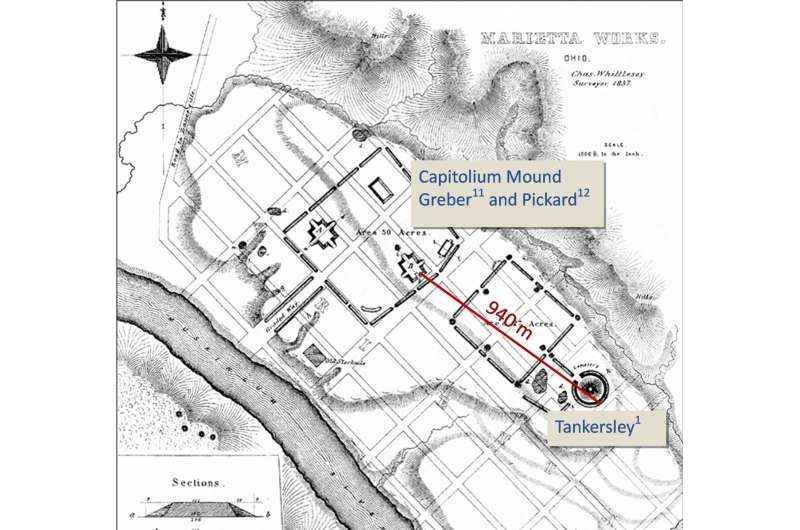This article has been reviewed according to Science X's editorial process and policies. Editors have highlighted the following attributes while ensuring the content's credibility:
fact-checked
peer-reviewed publication
trusted source
proofread
Archaeologists refute claims that a comet destroyed Hopewell culture

In February 2022, the journal Scientific Reports published a paper with the claim that a comet exploded over what is now Cincinnati around 1,500 years ago, raining fire over the area and destroying villages and farm fields, supposedly resulting in the rapid decline of the ancient Indigenous Hopewell culture.
Research led by University of Cincinnati archaeologist Dr. Kenneth Tankersley claimed "evidence of a cosmic airburst at 11 Hopewell archaeological sites in three states stretching across the Ohio River Valley." His evidence included the presence of meteorites, iron and silica-rich microspherules claimed to be from meteorites, and spikes in iridium and platinum—all supposedly associated with burned charcoal-rich Hopewell habitations.
Dr. Kevin C. Nolan, director and senior archaeologist of the Applied Anthropology Laboratories at Ball State University, along with eleven other scholars with varied expertise—including several specialists in the Hopewell culture and the Smithsonian Institution's Curator of Meteorites—have reviewed that evidence and found it to be wholly inadequate to support such an extraordinary claim.
The results of their review are published as a response in issue 13 of Scientific Reports, published August 9. Dr. Nolan had worked with very few of the other researchers prior, but they all came together through this effort to set the record straight on Dr. Tankersley's questionable research.
"There is no evidence for catastrophically burned habitations at any of the 11 Hopewell sites studied by Tankersley's team," Dr. Nolan said. "The burned surfaces identified by the University of Cincinnati researchers are either localized episodes of burning for ceremonial purposes, such as cremating the honored dead, or are not even burned surfaces at all.
"Whatever meteorites are present at these sites were collected by ancient Indigenous peoples—probably from various locations—and brought to these Hopewell sites to be crafted into ceremonial regalia," he continued. "The iron and silica-rich microspherules do not have the chemical composition typical of meteorites, and so are natural products of local soil chemistry."
Further evidence discovered by Dr. Nolan and his team indicates that the available radiocarbon dates for all the Hopewell sites claimed to have been destroyed by the effects of a comet airburst do not come close to being the same age.
"There is no evidence of any catastrophic comet airburst," Dr. Nolan concluded. "And there is no evidence of any supposed decline in the Hopewell culture that supposedly followed in the wake of the devastation caused by the alleged airburst.
"Many features of the Hopewell culture, including the construction of monumental earthworks and the accumulation of unusual raw materials obtained from places as distant as the Gulf Coast and the Rocky Mountains, did cease by around 400 CE. But there was no decline in local populations, so these cultural shifts simply reflect changes in the social and religious fabric of these Indigenous societies that, for a time, had knitted them together."
Dr. Nolan said the numerous instances of possibly intentional data manipulations to support the comet impact are even more troubling than the myriad errors in interpreting the evidence, and the research response clearly details those.
More information: Kevin C. Nolan et al, Refuting the sensational claim of a Hopewell-ending cosmic airburst, Scientific Reports (2023). DOI: 10.1038/s41598-023-39866-0
Journal information: Scientific Reports
Provided by Ball State University



















